北师大版(2019)选择性必修第二册:Unit 4 Humour Lesson3 Grammar课件(17张ppt)
文档属性
| 名称 | 北师大版(2019)选择性必修第二册:Unit 4 Humour Lesson3 Grammar课件(17张ppt) |
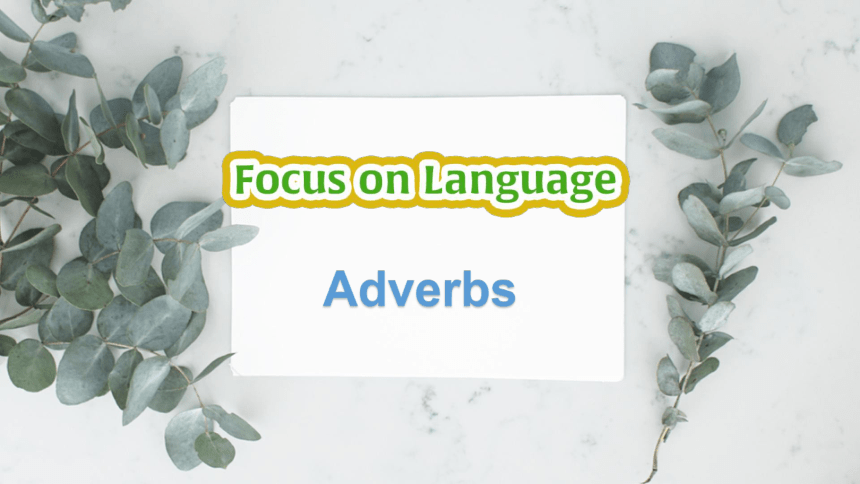
|
|
| 格式 | pptx | ||
| 文件大小 | 1.7MB | ||
| 资源类型 | 教案 | ||
| 版本资源 | 北师大版(2019) | ||
| 科目 | 英语 | ||
| 更新时间 | 2022-01-05 13:10:28 | ||
图片预览

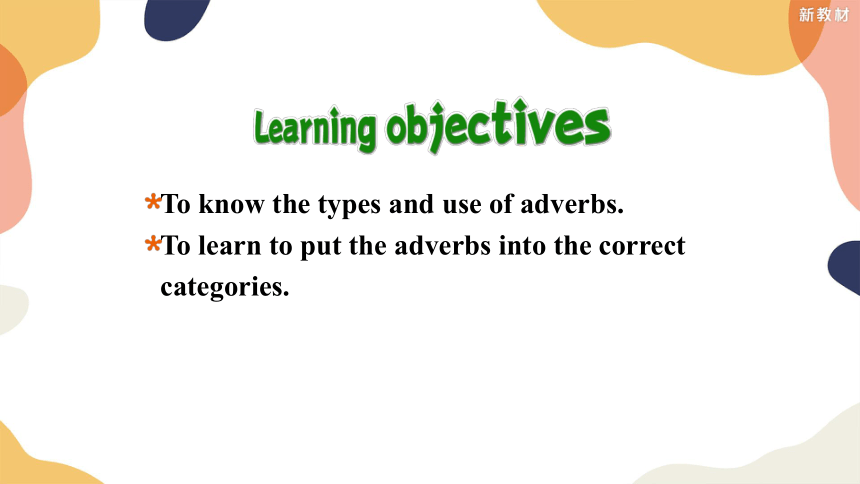
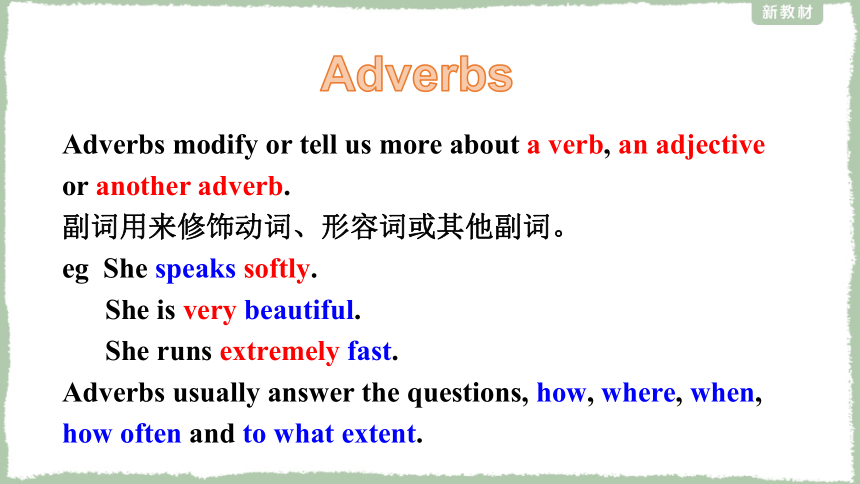
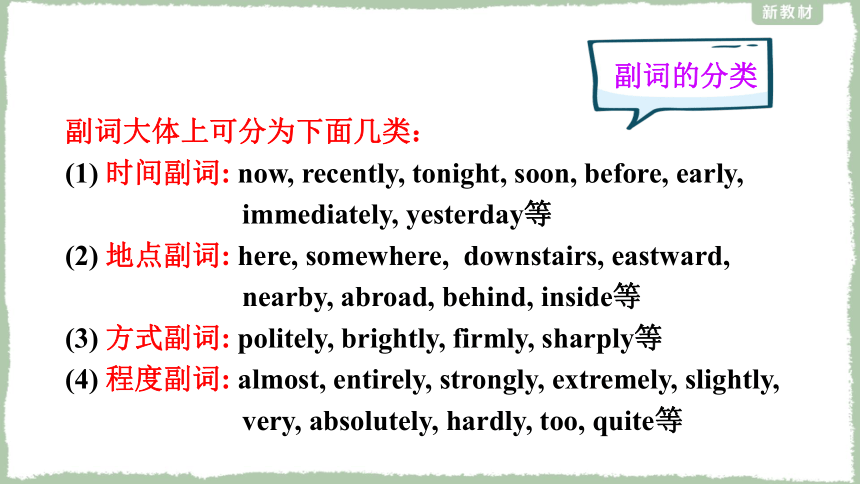

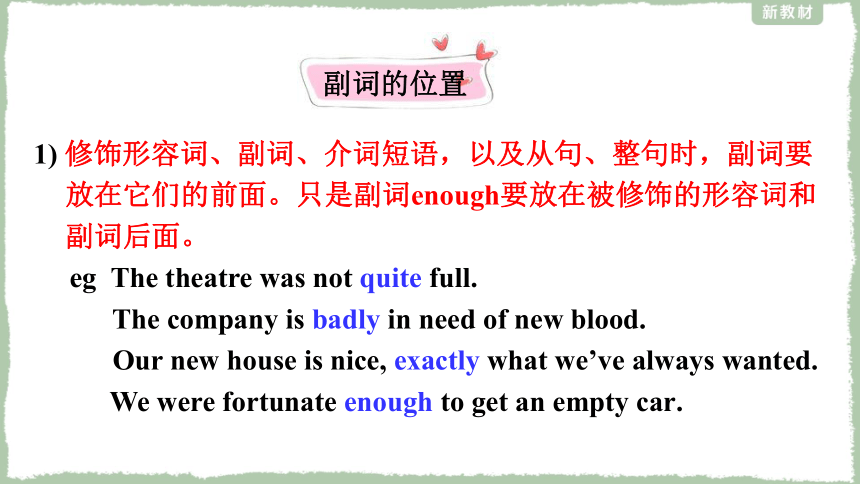
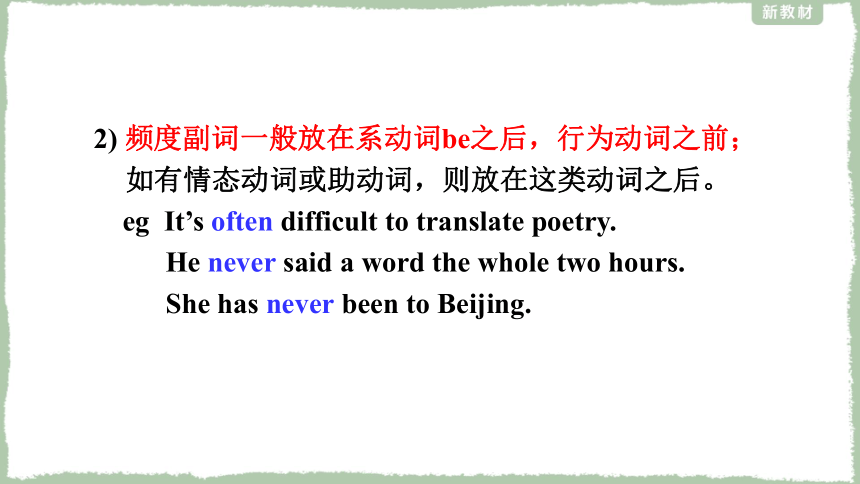
文档简介
(共17张PPT)
Adverbs
To know the types and use of adverbs.
To learn to put the adverbs into the correct categories.
Adverbs
Adverbs modify or tell us more about a verb, an adjective or another adverb.
副词用来修饰动词、形容词或其他副词。
eg She speaks softly.
She is very beautiful.
She runs extremely fast.
Adverbs usually answer the questions, how, where, when, how often and to what extent.
副词大体上可分为下面几类:
(1) 时间副词: now, recently, tonight, soon, before, early, immediately, yesterday等
(2) 地点副词: here, somewhere, downstairs, eastward, nearby, abroad, behind, inside等
(3) 方式副词: politely, brightly, firmly, sharply等
(4) 程度副词: almost, entirely, strongly, extremely, slightly, very, absolutely, hardly, too, quite等
副词的分类
(5) 频率副词: regularly, always, often, seldom, sometimes, never等
(6) 疑问副词: how, where, when, why等
(7) 连接副词: how, where, when, why等
(8) 关系副词: when, where, why等
(9) 句子副词: fortunately, hopefully, actually, interestingly等
(10) 与上文连接更紧的副词: however, therefore, besides, nevertheless, meanwhile等
1) 修饰形容词、副词、介词短语,以及从句、整句时,副词要放在它们的前面。只是副词enough要放在被修饰的形容词和副词后面。
eg The theatre was not quite full.
The company is badly in need of new blood.
Our new house is nice, exactly what we’ve always wanted.
We were fortunate enough to get an empty car.
副词的位置
2) 频度副词一般放在系动词be之后,行为动词之前;如有情态动词或助动词,则放在这类动词之后。
eg It’s often difficult to translate poetry.
He never said a word the whole two hours.
She has never been to Beijing.
词义有差别的同根副词
有些副词有两种不同的形式,一种与形容词同形,另一种由形容词加后缀-ly构成。二者有时区别不大,但在许多情况下二者是有区别的:前者多用在直接或具体的场合,后者多用在抽象的场合。
eg come near 走近(具体而直接)
nearly ten o’clock 近10点钟(抽象)
jump high 跳得高(具体)
highly developed 高度发展的(抽象)
Put the adverbs into the categories given in the Word plete the sentences below with the adverbs in the Word Builder.
Word Builder Adverbs
later quickly constantly happily truly rarely purely
Categories of adverbs adverbs
Adverbs of Time
Adverbs of Manner
Adverbs of Degree
Adverbs of Frequency
later, quickly, constantly, happily, truly, rarely, purely
later
quickly, happily
purely, truly
constantly, rarely
We don’t like snow so we _________ go skiing.
She’s very worried so she _________asks where her mother is.
That painting is _________ beautiful! Amazing!
When Helen got her new ballet shoes, she smiled, put them on and danced around __________.
rarely
constantly
truly
happily
5. I could tell, __________ by the look on his face, that he was disappointed.
6. The rain was pouring down so we __________ ran inside.
7. She __________ wrote warmly of his delightful words and behavior.
purely
quickly
later
1. Landing on the moon’s far side is _________ (extreme) challenging. (2020课标全国I)
extremely
2. As the small boat moved ________ (gentle) along the river he was left speechless by the mountains being silently reflected in the water. (2020课标全国III)
gently
按正确的顺序将所给单词组成陈述句。
1. every, goes, America, other, nowadays, Kate, to, year
2. times, has, Jack, been, several, this, to, London, year
Kate goes to America every other year nowadays.
Jack has been to London several times this year.
3. to, don’t, they, go, late, often, school
4. we, the, him, at, now, and, see, then, club
5. the, lived, country, I’ve, my, life, till, now, in, all, up
They don’t often go to school late.
We see him at the club now and then.
I’ve lived in the country all my life up till now.
选用方框内合适的副词完成下面短文。
A shopkeeper drove his donkey to the market to buy salt. When they crossed a stream, the donkey was 1. ___________ tired and fell into the water.
To the donkey's surprise, his load became 2. ___________ lighter. The shopkeeper took the donkey back to the market 3. ___________ he bought even more salt. When they reached the stream, the donkey fell into the water on purpose.
consequently, very, finally, much, immediately, where
very
much
where
The shopkeeper understood the donkey's trick 4. ___________. He returned to the market and bought sponges (海绵) instead of salt.
When they reached the stream, the donkey used his trick again. 5. ___________ the sponges became heavy with water.
“I hope you've learned your lesson,” the shopkeeper said. “If you use a trick to avoid work, you will 6. ___________ end up with more work.”
consequently, very, finally, much, immediately, where
immediately
Consequently
Finally
Write a short passage to describe your day. Please use as many adverbs as you can.
Adverbs
To know the types and use of adverbs.
To learn to put the adverbs into the correct categories.
Adverbs
Adverbs modify or tell us more about a verb, an adjective or another adverb.
副词用来修饰动词、形容词或其他副词。
eg She speaks softly.
She is very beautiful.
She runs extremely fast.
Adverbs usually answer the questions, how, where, when, how often and to what extent.
副词大体上可分为下面几类:
(1) 时间副词: now, recently, tonight, soon, before, early, immediately, yesterday等
(2) 地点副词: here, somewhere, downstairs, eastward, nearby, abroad, behind, inside等
(3) 方式副词: politely, brightly, firmly, sharply等
(4) 程度副词: almost, entirely, strongly, extremely, slightly, very, absolutely, hardly, too, quite等
副词的分类
(5) 频率副词: regularly, always, often, seldom, sometimes, never等
(6) 疑问副词: how, where, when, why等
(7) 连接副词: how, where, when, why等
(8) 关系副词: when, where, why等
(9) 句子副词: fortunately, hopefully, actually, interestingly等
(10) 与上文连接更紧的副词: however, therefore, besides, nevertheless, meanwhile等
1) 修饰形容词、副词、介词短语,以及从句、整句时,副词要放在它们的前面。只是副词enough要放在被修饰的形容词和副词后面。
eg The theatre was not quite full.
The company is badly in need of new blood.
Our new house is nice, exactly what we’ve always wanted.
We were fortunate enough to get an empty car.
副词的位置
2) 频度副词一般放在系动词be之后,行为动词之前;如有情态动词或助动词,则放在这类动词之后。
eg It’s often difficult to translate poetry.
He never said a word the whole two hours.
She has never been to Beijing.
词义有差别的同根副词
有些副词有两种不同的形式,一种与形容词同形,另一种由形容词加后缀-ly构成。二者有时区别不大,但在许多情况下二者是有区别的:前者多用在直接或具体的场合,后者多用在抽象的场合。
eg come near 走近(具体而直接)
nearly ten o’clock 近10点钟(抽象)
jump high 跳得高(具体)
highly developed 高度发展的(抽象)
Put the adverbs into the categories given in the Word plete the sentences below with the adverbs in the Word Builder.
Word Builder Adverbs
later quickly constantly happily truly rarely purely
Categories of adverbs adverbs
Adverbs of Time
Adverbs of Manner
Adverbs of Degree
Adverbs of Frequency
later, quickly, constantly, happily, truly, rarely, purely
later
quickly, happily
purely, truly
constantly, rarely
We don’t like snow so we _________ go skiing.
She’s very worried so she _________asks where her mother is.
That painting is _________ beautiful! Amazing!
When Helen got her new ballet shoes, she smiled, put them on and danced around __________.
rarely
constantly
truly
happily
5. I could tell, __________ by the look on his face, that he was disappointed.
6. The rain was pouring down so we __________ ran inside.
7. She __________ wrote warmly of his delightful words and behavior.
purely
quickly
later
1. Landing on the moon’s far side is _________ (extreme) challenging. (2020课标全国I)
extremely
2. As the small boat moved ________ (gentle) along the river he was left speechless by the mountains being silently reflected in the water. (2020课标全国III)
gently
按正确的顺序将所给单词组成陈述句。
1. every, goes, America, other, nowadays, Kate, to, year
2. times, has, Jack, been, several, this, to, London, year
Kate goes to America every other year nowadays.
Jack has been to London several times this year.
3. to, don’t, they, go, late, often, school
4. we, the, him, at, now, and, see, then, club
5. the, lived, country, I’ve, my, life, till, now, in, all, up
They don’t often go to school late.
We see him at the club now and then.
I’ve lived in the country all my life up till now.
选用方框内合适的副词完成下面短文。
A shopkeeper drove his donkey to the market to buy salt. When they crossed a stream, the donkey was 1. ___________ tired and fell into the water.
To the donkey's surprise, his load became 2. ___________ lighter. The shopkeeper took the donkey back to the market 3. ___________ he bought even more salt. When they reached the stream, the donkey fell into the water on purpose.
consequently, very, finally, much, immediately, where
very
much
where
The shopkeeper understood the donkey's trick 4. ___________. He returned to the market and bought sponges (海绵) instead of salt.
When they reached the stream, the donkey used his trick again. 5. ___________ the sponges became heavy with water.
“I hope you've learned your lesson,” the shopkeeper said. “If you use a trick to avoid work, you will 6. ___________ end up with more work.”
consequently, very, finally, much, immediately, where
immediately
Consequently
Finally
Write a short passage to describe your day. Please use as many adverbs as you can.
同课章节目录
- Unit 4 Humour
- Lesson 1 What’s So Funny?
- Lesson 2 Why Do We Need Humour?
- Lesson 3 My Favourite Comedian
- Unit 5 Education
- Lesson 1 Enlightening a Mind
- Lesson 2 The Objectives of Education
- Lesson 3 Understanding
- Unit 6 The Media
- Lesson 1 From Page to Screen
- Lesson 2 Questions about Media
- Lesson 3 The Advertising Game
